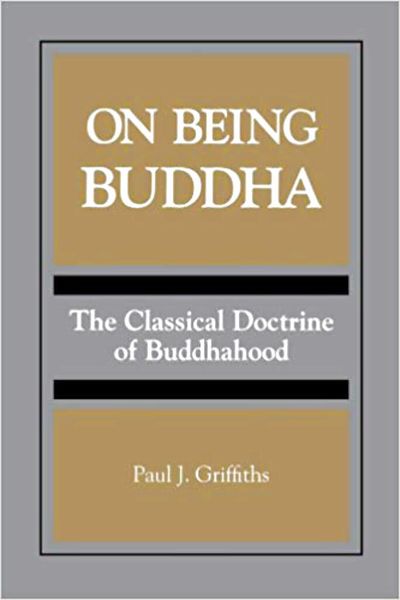On Being Buddha
< Books
(Created page with "{{Book |BookParentPage=Secondary Sources |FullTextRead=No |BookToc=* {{i|'''Foreward''' by Frank E. Reynolds|xiii}} * {{i|'''Preface'''|xvii}} * {{i|'''Acknowledgements'''|x...") |
|||
| Line 1: | Line 1: | ||
{{Book | {{Book | ||
|BookParentPage=Secondary Sources | |BookParentPage=Secondary Sources | ||
| + | |BookPerson={{Book-person | ||
| + | |PersonPage=Griffiths, P. | ||
| + | |PersonName=Paul J. Griffiths | ||
| + | }} | ||
|FullTextRead=No | |FullTextRead=No | ||
|BookToc=* {{i|'''Foreward''' by Frank E. Reynolds|xiii}} | |BookToc=* {{i|'''Foreward''' by Frank E. Reynolds|xiii}} | ||
| Line 14: | Line 18: | ||
* {{i|1.4 Applying the Theory|23}} | * {{i|1.4 Applying the Theory|23}} | ||
* {{i|'''Chapter Two: Buddhist Doctrine'''|}} | * {{i|'''Chapter Two: Buddhist Doctrine'''|}} | ||
| + | * {{i|2.0 Prolegomena|27}} | ||
| + | * {{i|2.1 The Doctrinal Digests|27}} | ||
| + | * {{i|2.2 The Authority of the Doctrinal Digests|33}} | ||
| + | * {{i|2.3 The Content and Subject-Matter of the Doctrinal Digests|41}} | ||
| + | * {{i|2.4 The Goals of the Doctrinal Digests|43}} | ||
| + | * {{i|2.5 Theories of Doctrine in the Doctrinal Digests|46}} | ||
| + | ** {{i|2.5.1 ''Rules of Recognition''|46}} | ||
| + | ** {{i|2.5.2 ''Rules of Interpretation''|51}} | ||
| + | * {{i|'''Chapter Three: Buddhalogical Doctrine'''|}} | ||
| + | * {{i|3.0 Prolegomena|57}} | ||
| + | * {{i|3.1 Buddhalogy and Maximal Greatness|58}} | ||
| + | * {{i|3.2 Titles and Epithets of Buddha|60}} | ||
| + | * {{i|3.3 Properties of Buddha|66}} | ||
| + | * {{i|3.4 Analytical and Organizational Schemata|75}} | ||
| + | * {{i|3.5 Metaphysical Embeddedness and Systematic Location|82}} | ||
| + | * {{i|'''Chapter Four: Buddha in the World'''|}} | ||
| + | * {{i|4.0 Prolegomena|87}} | ||
| + | * {{i|4.1 The Buddha-Legend|87}} | ||
| + | * {{i|4.2 Bodies of Magical Transformation|90}} | ||
| + | * {{i|4.3 Buddha's Perfections of Appearance in the World|97}} | ||
| + | * {{i|4.4 Buddha's Perfections of Action in the World|101}} | ||
| + | ** {{i|4.4.1 ''Spontaneity and Effortlessness''|103}} | ||
| + | ** {{i|4.4.2 ''Endlessness and Omnipresence''|107}} | ||
| + | ** {{i|4.4.3 ''Excursus: Buddha's Consumption of Food''|110}} | ||
| + | * {{i|4.5 Buddha's Perfections of Cognition in the World|115}} | ||
| + | ** {{i|4.5.1 ''Omnilinguality''|116}} | ||
| + | ** {{i|4.5.1 ''Awareness of What Is Possible and What Is Impossible''|118}} | ||
| + | * {{i|4.6 One Body of Magical Transformation at a Time? A Controversy|119}} | ||
| + | * {{i|'''Chapter Five: Buddha in Heaven'''|}} | ||
| + | * {{i|5.0 Prolegomena|127}} | ||
| + | * {{i|5.1 Ornamenting Heaven|128}} | ||
| + | * {{i|5.2 Bodies of Communal Enjoyment|134}} | ||
| + | * {{i|'''Chapter Six: Buddha in Eternity'''|}} | ||
| + | * {{i|6.0 Prolegomena|147}} | ||
| + | * {{i|6.1 Epistemic Predicates|151}} | ||
| + | ** {{i|6.1.1 ''Awareness Simpliciter''|151}} | ||
| + | ** {{i|6.1.2 ''Buddha's Awareness''|153}} | ||
| + | * {{i|6.2 Metaphysical Predicates|173}} | ||
| + | * {{i|'''Chapter Seven: Doctrinal Criticism'''|}} | ||
| + | * {{i|Doctrinal Criticism|181}} | ||
| + | |||
| + | * {{i|'''Notes'''|203}} | ||
| + | * {{i|'''Glossary'''|229}} | ||
| + | * {{i|'''Bibliography'''|233}} | ||
| + | * {{i|'''Index'''|253}} | ||
|AddRelatedTab=No | |AddRelatedTab=No | ||
}} | }} | ||
Latest revision as of 13:54, 21 March 2019
What is it like to be a Buddha? Is there only one Buddha or are there many? What can Buddhas do and what do they know? Is there anything they cannot do and cannot know? These and associated questions were much discussed by Buddhist thinkers in India, and a complex and subtle set of doctrinal positions was developed to deal with them. This is the first book in a western language to treat these doctrines about Buddha from a philosophical and thoroughly critical viewpoint.
The book shows that Buddhist thinkers were driven, when theorizing about Buddha, by a basic intuition that Buddha must be maximally perfect, and that pursuing the implications of this intuition led them into some conceptual dilemmas that show considerable similarity to some of those treated by western theists. The Indian Buddhist tradition of thought about these matters is presented here as thoroughly systematic, analytical, and doctrinal.
The book's analysis is based almost entirely upon original sources in their original languages. All extracts discussed are translated into English and the book is accessible to nonspecialists, while still treating material that has not been much discussed by western scholars.
(Source: back cover)
| Citation | Griffiths, Paul J. On Being Buddha: The Classical Doctrine of Buddhahood. SUNY Series, Toward a Comparative Philosophy of Religions. Albany: State University of New York Press, 1994. |
|---|---|


